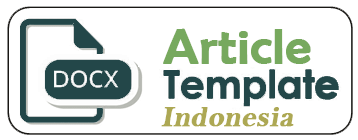Pengaruh Kepemimpinan Transformasional Terhadap Kinerja Karyawan Melalui Etika Kerja Islam
Pada KUD Tani Bahagia Kecamatan Gondang Kabupaten Mojokerto
DOI:
https://doi.org/10.47200/awtjhpsa.v1i2.1147Keywords:
transformational leadership, employee performance, Islamic work ethicAbstract
The purpose of this study was to analyze the effect of transformational leadership on employee performance through the Islamic work ethic of employees at the Cooperative Unit at Tani Bahagia Village, Gondang District, Mojokerto Regency, East Java, Indonesia. This type of research is quantitative research. The population in this study amounted to 75 employees. The data analysis technique used SEM-PLS with Smart-PLS 3.0 software. The results of the study found that transformational leadership has a positive effect on employee performance. Transformational leadership has a positive effect on Islamic work ethics. Islamic work ethic has a positive effect on employee performance. Islamic work ethic mediates the positive effect of transformational leadership on employee performance. The implication of this research is the importance of implementing a transformational leadership style in order to advance the quality of employee performance in the hope of increasing work activities, increasing and developing capital factors and strong business strategies, but also having to pay attention to human resources with good Islamic work ethics and have the value of good manners.
Downloads
References
Ahmad, M. S. (2011). Work ethics: an Islamic prospective. Journal of Human Sciences, 8(1), 850-859.
Bass, B.M. (1990). Bass and Stogdill’s Handbook of Leadership: Theory, Research and Managerial Applications, Free Press, New York, NY.
Bass, B.M. (1997). Personal selling and transactional/ transformational leadership. Journal of Personal Selling & Sales Management, 17(3), 19-28.
Bass, B.M. (1999). Two decades of research and development in transformational leadership. European Journal of Work and Organizational Psychology, 8(1), 9-32.
Basu, R. & Green, S.G. (1997). Pertukaran pemimpin-anggota dan perilaku transformasional dalam kepemimpinan diad pemimpin-anggota: pemeriksaan empiris inovatif. Jurnal Psikologi Sosial Terapan, 27(6), 477-499.
Burns, J. M. (1978). Leadership. New York: Harper & Row.
Suryowati, Estu. (2014). Ada 3.500 KUD yang Tidak Aktif di Indonesia, Kompas.com.
Ghozali, I. and Latan, H. (2015), Partial Least Squares: Concepts, Techniques and Applications Using SmartPLS 3.0 (For Empirical Research), 2nd ed., Diponegoro University Publishing Agency, Semarang.
Malhotra, N.K., Nunan, D. and Briks, F.D. (2012), Marketing Researh: An Applied Approach, Fourth, Pearson Educated, Edinburgh.
Marwansyah. (2010). Manajemen sumber daya manusia (2nd ed.). Alfabeta.
Meymand, M. M., Hosseiny, F. S., Khani, A., & Hakimi, I. (2016). Studying the effect of transformational leadership on Islamic work ethics, case study: affiliated organization of Iran Khodro. International Journal Of Humanities And Cultural Studies. 520-533.
Na-Nan, K., Chaiprasit, K., & Pukkeeree, P. (2018). Factor analysis-validated comprehensive employee job performance scale. International Journal of Quality & Reliability Management Factor, 35(10), 2436–2449.
Pawirosumarto, S., Sarjana, P. K., & Gunawan, R. (2017). The effect of work environment, leadership style, and organizational culture towards job satisfaction and its implication towards employee performance in Parador Hotels and Resorts, Indonesia. International Journal of Law and Management, 59(6), 1337-1358.
Petsri, C. (2014). The follower characteristics and organizational climate influencing operational efficiency of employees: A case study of the information and communications technology business group. Suthiparitha, 28(85), 145–160.
Rahman, M. F. W., & Kistyanto, A. (2019). Hubungan antara iklim psikologis terhadap kinerja karyawan melalui kepuasan kerja. DINAMIKA EKONOMI Jurnal Ekonomi Dan Bisnis, 12(2), 410–429.
Rahman, M. F. W., Kistyanto, A., & Surjanti, J. (2020). Flexible work arrangements in COVID-19 pandemic era, influence employee performance: The mediating role of innovative work behavior. International Journal of Management, Innovation & Entrepreneurial Research, 6(2), 10–22.
Rokhman, W. (2010). The effect of Islamic work ethics on work outcomes. EJBO-Electronic Journal of Business Ethics and Organization Studies, 15(1), 1-20.
Sekaran, U. and Bougie, R. (2016), Research Methods for Business: A Skill-Building Approach, 7th ed., John Wiley & Sons, Chichester.
Sodiq, A. (2018). Pengaruh Etika Kerja Islam, Kepemimpinan Transformasional Dan Motivasi Kerja Terhadap Kinerja Karyawan Di Kjks Bmt Logam Mulia Grobogan. BISNIS: Jurnal Bisnis dan Manajemen Islam, 6(1), 118-144.
Rokhman, Wahibur. (2011). Manajemen Sumber Daya Manusia, Nora Media Enterprise, Kudus.
Downloads
Published
How to Cite
Issue
Section
License
Copyright (c) 2022 Yulisharsasi Yulisharsasi, Jun Surjanti, Anang Kistyanto

This work is licensed under a Creative Commons Attribution-ShareAlike 4.0 International License.









